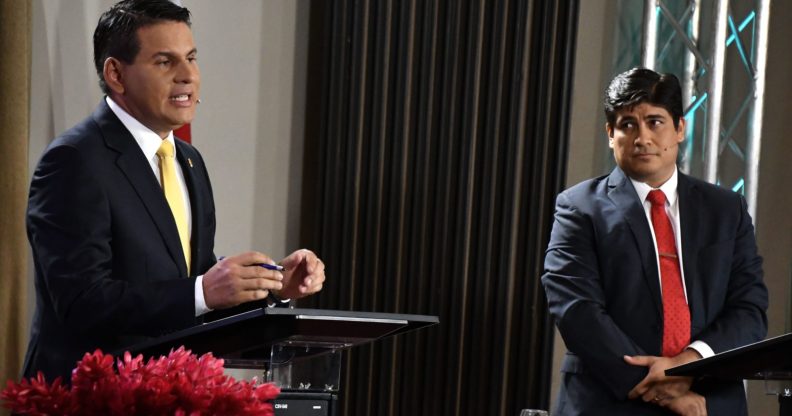LGBT rights hang in the balance as Costa Rica votes in Presidential election

Costa Rican presidential candidate Fabricio Alvarado (Photo by EZEQUIEL BECERRA/AFP/Getty Images)
Costa Rica is today heading to the polls to decide the country’s next President – and an anti-gay pastor who based his campaign on opposing same-sex marriage is tipped for victory.
The Central American country’s Presidential battle has been largely defined by a battle over same-sex marriage, with fringe evangelical Fabricio Alvarado Muñoz receiving a surge in support after running an aggressive anti-gay marriage campaign – besting a string of traditional candidates to make the run-off against centrist candidate Carlos Alvarado Quesada.
Alvarado Muñoz has vowed to withdraw Costa Rica from a pan-American human rights treaty that could require it to provide legal recognition to same-sex couples, while his opponent says the country should respect the human rights of LGBT people.

Fabricio Alvarado, presidential candidate of the National Restoration party (Photo by EZEQUIEL BECERRA/AFP/Getty Images)
Ahead today’s run-off election between the two candidates, polling suggests that Alvarado Muñoz has built a lead.
Every major opinion poll in March showed Alvarado Muñoz ahead, with a 7-point lead over his opponent.
The key to the election will likely be voters who backed other candidates in other rounds, with a massive 35 percent still undecided between the two or not planning to vote.
Polls opened at 6 AM local time today as the country heads out to vote in the Easter Sunday showdown between the pair.
A winner not expected to be announced until Monday at the earliest.
The battle over LGBT rights has become dominant after the Inter-American Court of Human Rights ruled that Costa Rica was violating human rights protections by preventing same-sex couples from marrying.
The court had found Costa Rica is in violation of its treaty obligations under the American Convention on Human Rights (ACHR) by not providing marriage equality.
The human rights court has jurisdiction over 16 countries, and six of them – Argentina, Brazil, Chile, Colombia, Mexico and Uruguay – signed a statement welcoming the news.
While Alvarado Quesada has said that Costa Rica should accept the ruling and “advance the agenda of equality”, Alvarado Muñoz has pledged to revoke the treaty altogether rather than comply.

Costa Rican frontrunner presidential candidate, Fabricio Alvarado, of the National Restoration party (Photo by JORGE RENDON/AFP/Getty Images)
Following his strong performance in the first round, he declared the results a victory for the “traditional family”.
The candidate said: “We propose the sovereignty of the family as the fundamental basis of society.”
“Costa Rica has sent a message to traditional parties – never again will they meddle with the family.”
Meanwhile, his rival Carlos Alvarado Quesada had stood firm over his commitment to human rights laws.
He said: “The Costa Rica of the 21st century requires a government that knows how to move forward with vigor, love, happiness (and) the agenda of equality.”
While there has been much pan-American solidarity around the court ruling, notably the US has shied away from pressing Costa Rica over the issue, and recently refused to take part in a statement welcoming the ruling.
The US was the only member of the Organization of American States (OAS) LGBTI Core Group that refused to sign on to a statement supporting the court’s opinion.
The seven nations that signed the statement are Argentina, Brazil, Canada, Chile, Colombia, Mexico and Uruguay.

Fabricio Alvarado, presidential candidate of the National Restoration party (Photo by EZEQUIEL BECERRA/AFP/Getty Images)
The statement says: “Argentina, Brazil, Canada, Chile, Colombia, Mexico and Uruguay, as members of the OAS LGBTI Core Group, welcome the Advisory Opinion of the Inter-American Court of Human Rights reiterating that sexual orientation and gender identity are protected categories under the American Convention on Human Rights and affirming that States have the responsibility to recognize, guarantee and protect the rights that derive from a family bond between persons of the same sex.
“The Court’s Opinion constitutes a valuable contribution to the jurisprudence of the Inter-American Human Rights System, as it reminds States of their obligations regarding guaranteeing and protecting the rights of LGBTI persons across the region.
“Furthermore, the Court understood that a person’s full autonomy to establish a permanent and marital bond is derived from the principle of human dignity, and that such a bond deserves equal rights and protection regardless of the sexual orientation of the parties.
“Likewise, the Advisory Opinion reaffirms the rights of transgender people by affirming that the change of name, image adjustment, as well as the rectification of sex or gender references, in registers and in identity documents so that these are consistent with self-perceived gender identity, is a right protected by the American Convention. As a consequence, States are obliged to recognize, regulate and establish the appropriate procedures for such purposes.
“Without prejudice to the sovereign right of all States to adopt policies and legislation in a progressive manner and to evolve on this matter at their own pace, we agree with the Court’s view that lack of consensus on respecting the rights of certain groups that are characterized by their sexual orientation or their gender identity or expression cannot be considered a reason to deny or restrict their human rights or perpetuate historical or structural discrimination against them.
“The aforementioned members of the Core Group are optimistic that this Advisory Opinion will provide elements for States to drive legislative, administrative and public policy reforms through which progress is made in the protection and guarantee, under equal conditions, of the rights of LGBTI people.”

